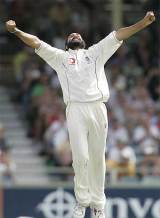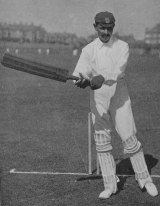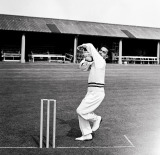Causes celebres
When selectors make mistakes or leave out heroes, the press and public love to make a song and dance about it. Steve Pittard selects his favourite ignored men
22-Mar-2007
When selectors make mistakes or leave out heroes, the press and public love to make a
song and dance about it. Steve Pittard selects his favourite ignored men
|
|

|
Monty Panesar
The first Sikh to play for England was viewed as a comical figure after his Bambi-on-ice fielding displays, yet his prodigious spinning talent insisted he be taken seriously. Monty-fever swept the nation and he was nominated for BBC Sports Personality of the Year. But he got a raw deal in the 2006-07 Ashes, sidelined until a BBC petition - and two defeats - demanded his inclusion in the third Test at Perth, where he took eight wickets. Duncan Fletcher did not seem overjoyed. Presumably he expected nothing less from the man he had called "the best finger-spinner in the world".
The first Sikh to play for England was viewed as a comical figure after his Bambi-on-ice fielding displays, yet his prodigious spinning talent insisted he be taken seriously. Monty-fever swept the nation and he was nominated for BBC Sports Personality of the Year. But he got a raw deal in the 2006-07 Ashes, sidelined until a BBC petition - and two defeats - demanded his inclusion in the third Test at Perth, where he took eight wickets. Duncan Fletcher did not seem overjoyed. Presumably he expected nothing less from the man he had called "the best finger-spinner in the world".
Dean Jones
Though Jones was the fastest Australian to clock up 5,000 ODI runs (in 128 innings) his bumptious personality - nicknaming himself "the Legend" - did not endear him to the authorities and, despite topping the averages on the 1992-93 Sri Lanka tour, he was dropped in his prime, aged 31. He peevishly announced his Test retirement and, though he changed his mind, the selectors did not. He remained a prolific scorer for Victoria and "Bring Back Deano" banners were often seen at the MCG years after his playing days were over.
Though Jones was the fastest Australian to clock up 5,000 ODI runs (in 128 innings) his bumptious personality - nicknaming himself "the Legend" - did not endear him to the authorities and, despite topping the averages on the 1992-93 Sri Lanka tour, he was dropped in his prime, aged 31. He peevishly announced his Test retirement and, though he changed his mind, the selectors did not. He remained a prolific scorer for Victoria and "Bring Back Deano" banners were often seen at the MCG years after his playing days were over.
Jonathan Agnew
Even astronomer Patrick Moore branded the selectors idiots for ignoring Agnew's claims through the 1987 summer as he took 101 wickets. Selector Micky Stewart said he was only a fag paper away from being picked but, when not chosen for the winter tour to Pakistan, Aggers called Stewart saying: "If I just missed getting in a party of 12, how come I can't get into a squad of 16?" The final insult came in 1989, when Ted Dexter went for Alan Igglesden, labelling him the "14th choice seamer", prompting Aggers to reach for the TMS chocolate cakes.
Even astronomer Patrick Moore branded the selectors idiots for ignoring Agnew's claims through the 1987 summer as he took 101 wickets. Selector Micky Stewart said he was only a fag paper away from being picked but, when not chosen for the winter tour to Pakistan, Aggers called Stewart saying: "If I just missed getting in a party of 12, how come I can't get into a squad of 16?" The final insult came in 1989, when Ted Dexter went for Alan Igglesden, labelling him the "14th choice seamer", prompting Aggers to reach for the TMS chocolate cakes.
David Gower
When Gower in 1990-91, following his Tiger Moth antics, got caught off the last ball before lunch his captain Graham Gooch never forgave him and declined to take him to India in 1992-93, despite being England's leading Test run scorer. Gower, told age was a factor, retaliated by not inviting Gooch, four years his senior, to his wedding: "He wasn't selected; he's too old." To an adoring public Gower's exclusion was unthinkable and MCC forced a Special General Meeting, narrowly failing to pass a vote of no confidence on the selectors.
When Gower in 1990-91, following his Tiger Moth antics, got caught off the last ball before lunch his captain Graham Gooch never forgave him and declined to take him to India in 1992-93, despite being England's leading Test run scorer. Gower, told age was a factor, retaliated by not inviting Gooch, four years his senior, to his wedding: "He wasn't selected; he's too old." To an adoring public Gower's exclusion was unthinkable and MCC forced a Special General Meeting, narrowly failing to pass a vote of no confidence on the selectors.
|
|

|
KS Ranjitsinhji
The gifted Indian prince did not consider himself a foreigner in England but MCC president Lord Harris, though born himself in Trinidad, did not approve and left Ranji out of the first Test at Lord's in 1896. After an outcry Ranji made his debut at Old Trafford, having checked that Australia had no objections, and made 62 and 154 not out in a losing cause. Not everyone was impressed: Lord Home Gordon, of Sussex like Ranji, was told by a fellow MCC member he should be expelled from MCC for having "the disgusting degeneracy to praise a dirty black".
The gifted Indian prince did not consider himself a foreigner in England but MCC president Lord Harris, though born himself in Trinidad, did not approve and left Ranji out of the first Test at Lord's in 1896. After an outcry Ranji made his debut at Old Trafford, having checked that Australia had no objections, and made 62 and 154 not out in a losing cause. Not everyone was impressed: Lord Home Gordon, of Sussex like Ranji, was told by a fellow MCC member he should be expelled from MCC for having "the disgusting degeneracy to praise a dirty black".
Don Shepherd
Peddling his brisk offcutters, the Glamorgan veteran took more first-class wickets - over 2,000 - than anyone else not to have played Test cricket. "Had he been an Australian, he would have played for his country many, many times," Richie Benaud reckoned and the umpire Kevin Lyons even suggested he seek compensation. He was always up against greats (Laker, Lock) or stronger batsmen (Illingworth, Titmus). Perhaps ultimately he was viewed as a wet-track bully, who thrived on his damp home pitches yet struggled at The Oval and Lord's where performances mattered.
Peddling his brisk offcutters, the Glamorgan veteran took more first-class wickets - over 2,000 - than anyone else not to have played Test cricket. "Had he been an Australian, he would have played for his country many, many times," Richie Benaud reckoned and the umpire Kevin Lyons even suggested he seek compensation. He was always up against greats (Laker, Lock) or stronger batsmen (Illingworth, Titmus). Perhaps ultimately he was viewed as a wet-track bully, who thrived on his damp home pitches yet struggled at The Oval and Lord's where performances mattered.
Mike Hussey
Australia's opponents were baffled and pleased when they had not chosen Hussey until he was over 30. After scoring over 15,000 first-class runs, 'Mr Cricket' was finally given his Test debut - courtesy of a Justin Langer fractured rib - and wasted little time becoming the quickest ever batsman, 166 days, to score 1,000 Test runs. His form was Bradmanesque; at one time he averaged over 100 in Tests and ODIs, the latter dropping below triple figures only after 33 matches.
Australia's opponents were baffled and pleased when they had not chosen Hussey until he was over 30. After scoring over 15,000 first-class runs, 'Mr Cricket' was finally given his Test debut - courtesy of a Justin Langer fractured rib - and wasted little time becoming the quickest ever batsman, 166 days, to score 1,000 Test runs. His form was Bradmanesque; at one time he averaged over 100 in Tests and ODIs, the latter dropping below triple figures only after 33 matches.
Leslie Hylton
Jamaicans were outraged when West Indies, who could afford only a 15-man squad, omitted fast bowler Leslie Hylton for the 1939 England visit and launched a public appeal fund. Still £400 short on sailing, he was gratefully received, playing in the first two Tests. But it was a poor investment as he took only three wickets. Later Hylton shot dead his adulterous wife but his defence - attempting to shoot himself but missed - was undermined when seven bullets were discovered in her. He was hanged and is the only known Test cricketer to have been executed.
Jamaicans were outraged when West Indies, who could afford only a 15-man squad, omitted fast bowler Leslie Hylton for the 1939 England visit and launched a public appeal fund. Still £400 short on sailing, he was gratefully received, playing in the first two Tests. But it was a poor investment as he took only three wickets. Later Hylton shot dead his adulterous wife but his defence - attempting to shoot himself but missed - was undermined when seven bullets were discovered in her. He was hanged and is the only known Test cricketer to have been executed.
Peter Roebuck
In 1989 the studious Somerset batsman was widely touted - and championed by Ray Illingworth - to captain in the West Indies and led a representative side including Nasser Hussain and Alec Stewart in a one-day contest against Holland. Chasing only 176, his side were caning the bowling at 100 for 1. But Roebuck had not realised that a 55- minute rain delay did not reduce the overs and England, unable to see in the darkness, lost by three runs with three wickets in hand and Rob Bailey 68 not out. Ted Dexter decided that Graham Gooch - despite having all the charisma of "a wet fish" - was the better bet.
In 1989 the studious Somerset batsman was widely touted - and championed by Ray Illingworth - to captain in the West Indies and led a representative side including Nasser Hussain and Alec Stewart in a one-day contest against Holland. Chasing only 176, his side were caning the bowling at 100 for 1. But Roebuck had not realised that a 55- minute rain delay did not reduce the overs and England, unable to see in the darkness, lost by three runs with three wickets in hand and Rob Bailey 68 not out. Ted Dexter decided that Graham Gooch - despite having all the charisma of "a wet fish" - was the better bet.
|
|

|
Subhash 'Fergie' Gupte
Possessing two googlies, he was considered better than Shane Warne according to Garry Sobers but he was appallingly treated by India. During England's 1961 visit Gupte's team-mate Kripal Singh invited the receptionist at Delhi's Imperial Hotel for a drink but she took exception and lodged a complaint against the occupants in room seven. The Indian board secretary, AN Ghosh, banned Gupte for the West Indies tour for "failing to prevent his colleague from making the call". Despite boasting 149 wickets at under 30, the 32-year-old never played for India again and emigrated to Trinidad.
Possessing two googlies, he was considered better than Shane Warne according to Garry Sobers but he was appallingly treated by India. During England's 1961 visit Gupte's team-mate Kripal Singh invited the receptionist at Delhi's Imperial Hotel for a drink but she took exception and lodged a complaint against the occupants in room seven. The Indian board secretary, AN Ghosh, banned Gupte for the West Indies tour for "failing to prevent his colleague from making the call". Despite boasting 149 wickets at under 30, the 32-year-old never played for India again and emigrated to Trinidad.
Frank Worrell
"Alexander Must Go, Make Worrell Captain" was the unsubtle headline in 1960 by CLR James, spokesperson for the Caribbean rebellion against the archaic practice of white men leading West Indies. Gerry Alexander was a decent chap but formal: he sent home potential matchwinner Roy Gilchrist for bowling a beamer at an old Cambridge chum. Worrell's elevation helped bridge the inter-island rivalries and he was admired for his charity. He donated blood for Nari Contractor after chucker Charlie Griffith had sent the Indian to hospital.
"Alexander Must Go, Make Worrell Captain" was the unsubtle headline in 1960 by CLR James, spokesperson for the Caribbean rebellion against the archaic practice of white men leading West Indies. Gerry Alexander was a decent chap but formal: he sent home potential matchwinner Roy Gilchrist for bowling a beamer at an old Cambridge chum. Worrell's elevation helped bridge the inter-island rivalries and he was admired for his charity. He donated blood for Nari Contractor after chucker Charlie Griffith had sent the Indian to hospital.
This article was first published in the February 2007 issue of The Wisden Cricketer.
Click here for further details.
Click here for further details.